JIMCA CONDUCTS “COPYRIGHT CLASS”AT NAKAZATO ELEMENTARY SCHOOL, SETAGAYA WARD, TOKYO
- 19Dec 2013
Tokyo: On December 12, 2013, Japan and International Motion Picture Copyright Association (JIMCA) organized and conducted a Copyright Class for the 62 fifth and sixth graders of Nakazato Elementary School in Setagaya Ward, Tokyo. The school was certified as one of the UNESCO Associated Schools in 2012 with the aim of developing new educational curriculum and methods to nurture talented individuals. The Copyright Class was conducted as part of new curriculum.
The class was carried out during the fifth and sixth periods of the school day, a JIMCA's staff member served as a lecturer, and a student enrolled in School Education Major, Graduate School of Education, Waseda University assisted as a facilitator.
In the first half of the lesson, held in the gymnasium, a quiz style activity called “Is this real or fake? Quiz Rally” required children to tackle six quizzes to identify the authenticity of goods such as movie DVDs and toys portraying popular characters. For the second half of the lesson, students returned to their classrooms and discussed the type of copyright issues that elementary students might encounter. One case study proposed: “I secretly entered a contest using my friend's drawing and it was selected for the Best Work Award.” We asked each grade whether, according to the Copyright Law, this would become an issue or not? The group discussions were active and constructive. Students suggested for example that, “It is not the correct thing to do unless you first ask your friend's permission,” or, “Since the quality of the work was so high, it was right to enter it, and it was good that the work was awarded.”
The students then gathered again at the gymnasium to present the findings from each class. At the end of the lesson, a JIMCA staff member provided an easy-to-understand explanation of copyright matters.
Regarding the Copyright Class, one female student from the sixth grade said, “I love games, animation, and movies. Because I took this Copyright Class, I was able to feel close to the creators of games and animation, and it made me want to work for a movie company in the future.”
Principal Seiko Kashiwabara also said, “I believe that students were able to foster their abilities of observation via the activity of identifying the toys and goods close to them and were conscious of their authenticity. I also think that through the group discussions they were not only able to recognize their own views but also others' from various grades. The lesson which provided a focus on improving ethical ideology and respecting human rights was a perfect match to our school educational principal.”
Although copyright education is included in the government curriculum guidelines, some schools still have difficulty incorporating it. In order to introduce the ideas of respecting intellectual property rights and copyright to young generations, JIMCA has visited a number of elementary schools in different parts of Japan and conducted Copyright Classes annually, visiting five to six schools since 2011.
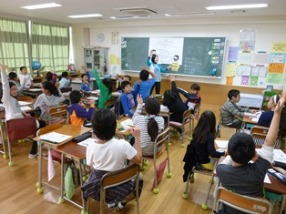 |
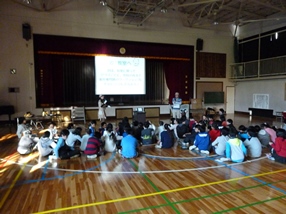 |
JIMCA CONDUCTS “COPYRIGHT CLASS” AT YAMAGATA CITY NISHI ELEMENTARY SCHOOL
- 13Nov 2013
Tokyo: On November 6, 2013, Japan and International Motion Picture Copyright Association (JIMCA) organized and conducted a Copyright Class for the 90 sixth-graders of Yamagata City Nishi Elementary School in Yamagata Prefecture. Students enrolled in School Education Major, Special Course of Education from Waseda University assisted as facilitators.
The class was conducted during the third and fourth periods of the school day, and a quiz style activity called “Is this real or fake? Quiz Rally” required children to tackle eight quizzes to identify the authenticity of goods such as movie DVDs and stuffed animals.
During the second half of the lesson, students returned to their classrooms and performed group discussions on copyright issues that elementary students might encounter. One case study reflected on the following: “When everyone was working on their wire craft works for a school exhibition, student A said, 'That's very cool! I'll do the same!', then made an exact same copy of my work and submitted it for the school exhibition without asking my permission.” We asked each class whether this would become an issue or not according to the Copyright Law. The group discussions were very active and constructive. Opinions such as “Copying someone's work is wrong,” and “That's no problem because we are friends” etc., were raised by the students who then gathered again at the gymnasium to present the findings from each class.
At the end of the lesson, a JIMCA staff member provided an easy-to-understand explanation of copyright matters. One 12-year-old male student who participated in the Copyright Class said, “There were some difficult questions in the quiz involving identifying authenticity, but I have gained a great understanding of copyright, and it was a very good study. From now on, I will give consideration to the creators as well.”
JIMCA has visited a number of elementary schools in different parts of Japan and conducted Copyright Classes annually with five to six schools since 2011. This is the first time that a Copyright Class was held in Yamagata prefecture.
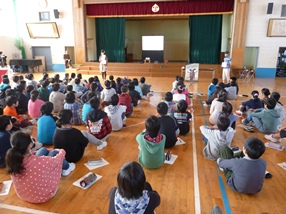 |
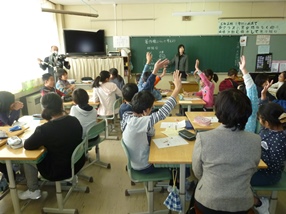 |
JIMCA CONDUCTS “DISPATCHED COPYRIGHT CLASSES” AT OKAZAKI CITY HANE ELEMENTARY SCHOOL, AICHI PREFECTURE
- 2Jul 2013
Aichi: On June 21, 2013, Japan and International Motion Picture Copyright Association (JIMCA) organized and conducted a Dispatched Copyright Class for the 103 sixth graders of Okazaki City Hane Elementary School in Aichi Prefecture. One of JIMCA’s staff members served as a lecturer, and students enrolled in School Education Major, Special Course of Education from Waseda University assisted as facilitators.
The class was conducted during the fifth and sixth periods of the school, and a quiz style activity called “Is this real or fake? Quiz Rally” was performed at the gymnasium during the first half of the lesson where children tackled 8 quizzes to identify the authenticity of goods such as movie DVDs and stuffed animals. The highest scorer was a female student who provided 7 correct answers.
Students returned to their classrooms for group discussions regarding the copyright issues that elementary students might encounter, and then gathered again at the gymnasium to present the compiled discussion results of each class. A JIMCA staff member then gave an easy-to-understand explanation of copyright issues at the end of the lesson.
Since 2011, JIMCA has visited many elementary schools in different areas around Japan and conducted the Dispatched Copyright Classes annually to five to six schools.. This is the second school where classes have been conducted this year, following a visit in February to the Komae City Komae Dai-Roku Elementary School in Tokyo.
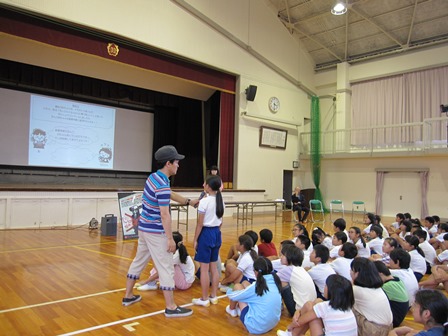
PARTICIPATION IN “GOVERNMENT AND PRIVATE SECTOR CYBER CRIME PREVENTION CLASS”AS PART OF OPERATION OF“HYOGO PREFECTURAL GOVERNMENT AND PRIVETE SECTORS' JOINT PROJECT FOR PREVENTION MEASURES AGAINST CYBERSPACE CRIMINAL THREATS”
- 11Apr 2013
Kobe: On April 11, 2013, Takashi Ajimura, Representative Director of Japan and International Motion Picture Copyright Association (JIMCA), attended and presented a lecture for “Government and Private Sector Cyber Crime Prevention Class” held at Mikage High School, Hyogo Prefecture.
The class, hosted by the Hyogo Prefecture Cybercrime Prevention Center whom the Hyogo Prefectural Police commissions to, focuses on teaching high school students about some of the copyright regulations, particularly for a general overview of illegal downloading, in addition to the risks and cautionary notes regarding the use of the internet with some of the latest arrest incidences given as examples.
JIMCA, as one of the representative organizers for the Subcommittee on Information Sharing Measures, participated in this class for the operation of Hyogo Prefectural Government and Private Sectors' Joint Project for Prevention Measures against Cyberspace Criminal Threats, and provided easy explanations in regard to the punitive regulations imposed for the illegal downloading of commercial movie and music files for the purpose of private use (i.e. Illegal Private Downloading) if they are knowingly downloaded from an illegitimate source.
Educational gifts (clear folders) produced by JIMCA as part of the operation, Hyogo Prefectural Government and Private Sectors' Joint Project for Prevention Measures against Cyberspace Criminal Threats, were distributed directly to the 380 freshman students and the teachers attending.
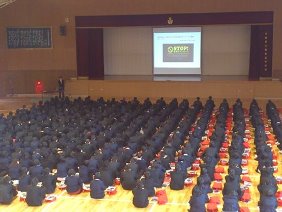 |
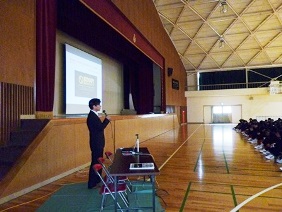 |


